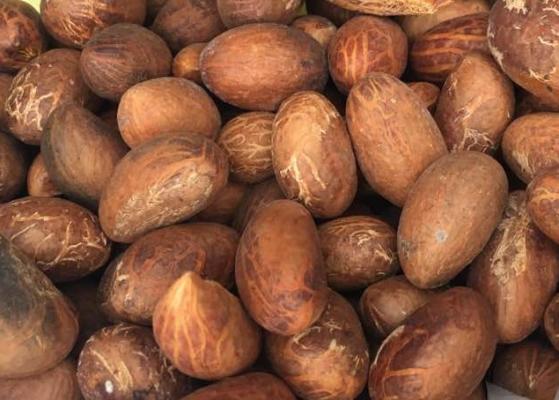Bitter kola, with the botanical name Garcinia kola (Heckel), also known as African wonder nut, is a species of flowering plants belonging to the family Guttiferae. It grows in coastal rainforests in the south-western and south-eastern parts of Nigeria, and can also be found in some other African countries, such as Cameroon, Côte de Ivoire, Ghana, Liberia and Gabon. Bitter kola is called “mijin-goro” in Hausa, “akiilu” in Igbo and “orogbo” in Yoruba.
Constituents
The bitter plant is believed to contain carbohydrate, crude fibre, fat, crude protein, vitamins and minerals, such as Vitamins A, C, E, B1, B2, B3, fibre, calcium, potassium and iron, as well as other antioxidants.

Passay showed that tannin, sapoium, phytic acid, phenol, Trypsin inhibitor, sterol, flavonoid, alkaloid, oxalate, caffeine, theobromine and Hydrogen cyanide were present in significant amounts. Kolavinol was found to be an active compound of bitter kola.
Preparations
The fruits, seeds, nuts and bark are used for their pharmacological activities. The nuts may be eaten raw. Different parts of the plant may be taken as decoctions alone or in combination with other medicinal plants. Extracts of the plant may also be used.
Pharmacological actions and medicinal uses
The bitter kola tree has been widely used both in medicine and cosmetology due to its stimulating, astringent, draining, decongestant, antioxidant, anti-inflammatory, vaso-protecttive, lipolytic, bronchiodilator, antihepatotoxic, antimicrobial and a number of other properties.
As a result of the saponin content, Garcinia kola helps to improve the function of the lungs by expanding the alveolar ducts and sacs, and as such, strengthens the fibre in the tissue of the lungs, thereby providing relief for chest cold and prevents cold altogether. The antibacterial and antiviral properties of bitter kola make it useful in the treatment of sore throat and cough, bronchitis, typhoid, tuberculosis, diarrhoea, and other bacterial infections.
Studies have shown that the seeds of bitter kola possess the ability to treat acute fever and malaria, lower blood glucose, treat glaucoma, manage osteoarthritis, combat nausea and vomiting in pregnant women, detoxify the human body during food poisoning and repel snakes.
Bitter kola helps to promote weight loss by its hunger suppressing and thirst stimulating properties. The caffeine and theobromine content in bitter kola makes it a good cognitive booster and natural diuretic.
Research has shown that garcinia kola has aphrodisiac effects in male folks, and as such is used in the treatment of erectile dysfunction. Nigerian women sometimes eat bitter kola to improve fertility. Bitter kola has anti-cancer properties.
Adverse effects
The most common side effects associated with bitter kola include dry mouth, insomnia, rapid heartbeat, nausea, stomach cramps, diarrhea and hives.
Economic potentials
Bitter kola costs between ₦200 and ₦500 per kg in the Nigerian market. A study in Ore, Ondo State, showed that trade of garcinia kola contributed ₦118,800.00 quarterly net income to each family. Economic analysis of bitter kola marketing in Osun State revealed a gross margin of ₦2,694,800, a net profit of ₦2,102,200, with a benefit cost ratio of ₦1.53K.
Nigeria produces about 150,000 tons of bitter kola annually, of which over 90 per cent are locally consumed. However, it is in great demand in Britain, America, China, India and other Asian countries. Bitter kola is used for food purposes and as raw material in the pharmaceutical and food industries. There is growing demand for bitter kola for traditional medical therapy.
Great opportunities abound in the cultivation and distribution of bitter kola both locally and internationally.











usa pharmacy india best online international pharmacies india
40 mg tadalafil: http://tadalafilonline20.com/ tadalafil
viagra india how long before sex do you take viagra buy viagra connect usa
9lpa2 ashjf mx3y
cialis mims philippines cialis 10 mg precio farmacia cialis sight loss
cheap secured cash loans money loans in hattiesburg ms payday loans college park ga
easy payday cash.com online cash advance south carolina how to get cash advance chase sapphire
cash advance loans utah money loan for international students rochester payday loans
overnight pharmacy 4u cialis cialis sell generic cialis or tadalafil
wo bekomme ich billig cialis dГ©lai d’action du cialis does cialis cause infertility
cash advance norco ca payday loan lender comparison can you loan money from your 401k
viagra mit paypal brand viagra sale can i buy viagra without a prescription
canada drug prices Viagra Soft Flavored walgreens pharmacy
herbals 24 hour pharmacy online pharmacy canada
cheap prescription drugs online pharmacy without dr prescriptions best online pharmacy
canada pharmacy online northwest pharmacy pharmacies online
viagra samples canada viagra with dapoxetine order generic viagra online
best canadian online pharmacies viagra espaГ±ol rx online
no 1 canadian pharcharmy online Cialis most reliable canadian pharmacies
female viagra pills australia viagras forsale cost of viagra 100mg